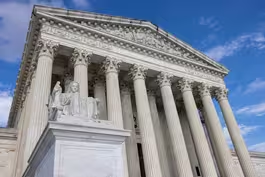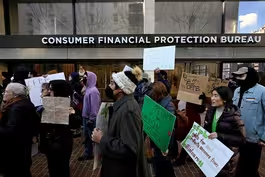
Brooks and Capehart on Trump's faceoff with the courts
Clip: 4/18/2025 | 11m 1sVideo has Closed Captions
Brooks and Capehart on Trump's faceoff with the courts
New York Times columnist David Brooks and Washington Post associate editor Jonathan Capehart join William Brangham to discuss the week in politics, including President Trump's continued faceoff with the courts, if Republicans will begin pushing back against the president and Harvard rejecting Trump's demands.
Problems playing video? | Closed Captioning Feedback
Problems playing video? | Closed Captioning Feedback
Major corporate funding for the PBS News Hour is provided by BDO, BNSF, Consumer Cellular, American Cruise Lines, and Raymond James. Funding for the PBS NewsHour Weekend is provided by...

Brooks and Capehart on Trump's faceoff with the courts
Clip: 4/18/2025 | 11m 1sVideo has Closed Captions
New York Times columnist David Brooks and Washington Post associate editor Jonathan Capehart join William Brangham to discuss the week in politics, including President Trump's continued faceoff with the courts, if Republicans will begin pushing back against the president and Harvard rejecting Trump's demands.
Problems playing video? | Closed Captioning Feedback
How to Watch PBS News Hour
PBS News Hour is available to stream on pbs.org and the free PBS App, available on iPhone, Apple TV, Android TV, Android smartphones, Amazon Fire TV, Amazon Fire Tablet, Roku, Samsung Smart TV, and Vizio.
Providing Support for PBS.org
Learn Moreabout PBS online sponsorshipWILLIAM BRANGHAM: Trump's continued face-off with the courts has some questioning whether the U.S. has reached the point of a constitutional crisis.
On that and more, we turn to the analysis of Brooks and Capehart.
That's New York Times columnist David Brooks, and Jonathan Capehart, associate editor of The Washington Post.
Good evening, gentlemen.
Nice to have you both.
I want to talk about President Trump and the courts.
The president has wielded his authority in, I think by any measure, an extraordinary way, slashing budgets and jobs across the federal government, targeting billions of dollars at colleges and universities, threatening major law firms.
On immigration, we have all been following that remarkable process.
But the courts, David, in many instances, have stood up to the president.
Do you think that they are doing their appropriate role of check and balance?
DAVID BROOKS: Yes, I think they are.
The question is whether Trump pays any attention to the courts.
And so, to me, watching the Trump administration is just watching the administration to say, we have decided stoplights don't apply to us.
Yellow lines down the middle don't apply.
We're just going to roll over it.
And you stop us.
And when you think constitutional crisis, you think, like, two sides facing off on the barricades.
But I have actually lived through a constitutional crisis.
When I was at The Wall Street Journal, I covered the end of the Soviet Union.
And it was obviously very different in many ways.
But one thing was interesting, the mental adjustment I had to make.
When I went to the Soviet Union... WILLIAM BRANGHAM: The mental adjustment.
DAVID BROOKS: Yes, at the very end, because I grew up in a country where I assumed, if a law is passed, then things will change, it will be enforced, and it'll be a reality on the ground.
But at the very end of the Soviet Union, they would pass law after law, and nothing happened.
Nobody bothered to enforce it.
It never had any implementation.
So the laws were fictional, because people had lost faith in the laws, lost faith in the whole system.
And so what happens now is not that you get this big conflict, but Trump just says, we're going to arrest a guy who -- and give him no due process, and there's, like, no confrontation.
It just happens.
And nobody's there to stop it, because famously the judiciary doesn't have an army.
WILLIAM BRANGHAM: Right.
Jonathan, what do you think about that?
I mean, we had Georgetown Law Professor Steve Vladeck on the show.
He says, we're not quite there yet, because the Trump administration has not yet formally blown through, overtly ignored a direct court order yet.
But we also heard from the League of Women Voters, the nonpartisan organization, who this week -- I'd like to read you this quote.
They said -- quote -- "It has now been 87 days since the start of the Trump administration.
From the flagrant disregard for congressional authority and governmental checks and balances, to defying Supreme Court orders to bring Kilmar Abrego Garcia back home, one thing is abundantly clear.
Our country is in a constitutional crisis."
Where do you come down on that?
JONATHAN CAPEHART: I am glad you read that, because I was shaking, I was nodding in agreement with the League of Women Voters.
How can you say that the president hasn't defied court orders?
You have got Judge Boasberg, who is threatening to -- says yesterday that there's probable cause to charge the government or lawyers arguing on behalf of the government with criminal contempt.
Why?
Because the president of the United States and his administration ignored his order to not deport those folks to El Salvador.
So, I know there are these formal definitions of what a constitutional crisis is, but from where I sit in my "Schoolhouse Rock!"
knowledge of how our government is supposed to work... JONATHAN CAPEHART: ... we are in one.
We have a president of the United States who on a daily basis blows past the guardrails, pushes as far as he can get to test the system.
And what has heartened me this week is hearing from Judge Boasberg and the judge who ruled yesterday in that beautiful seven-page opinion, where they are not just saying, this isn't the right thing to do.
They are pushing back just as aggressively from their respective federal benches.
And I think we will be better for it.
WILLIAM BRANGHAM: Do you think, David, that - - I have been reading some Republican voices saying specifically on this Abrego Garcia case that this might be a bridge too far, that they feel that this -- simply jumping over due process completely.
Do you think that there will be from the right some real critique that's meaningful?
DAVID BROOKS: It depends if you have the kind of job where you have to get elected to hold it.
DAVID BROOKS: And so one of the things I have been struck by is that a lot of things Trump has done, the experts have said, this is crazy.
And when Ukraine, the Zelenskyy meeting in the Oval Office, Republican and Democratic foreign policy experts said this is crazy.
The tariffs, Republican and Democratic experts said this is crazy.
The Garcia case, Republican and Democratic constitutional scholars say this is crazy.
But as for elected officials, I would say we have not yet seen that.
I have to assume, from what I know of them personally, is that they are personally appalled, but they're doing what they have been doing for the last -- all the years that we have -- Trump has been around.
JONATHAN CAPEHART: Although we have seen some -- well, one.
I was going to say some, one Senator Lisa Murkowski of Alaska, who is no shrinking violet when it comes to going toe to toe with President Trump or standing up to her own leadership.
And she is on camera, on record saying, we're all afraid.
And that's... WILLIAM BRANGHAM: We actually have that.
JONATHAN CAPEHART: Oh.
WILLIAM BRANGHAM: Let's play what she had to say.
This is Senator Lisa Murkowski, senator of Alaska.
Let's listen to what she said.
SEN. LISA MURKOWSKI (R-AK): We are all afraid, OK?
I'm oftentimes very anxious myself about using my voice, because retaliation is real.
WILLIAM BRANGHAM: Retaliation is real.
JONATHAN CAPEHART: And that's what Republicans in the House and the Senate and all over the country, elected ones, have been dealing with since Trump one.
And I think the fact that we have that on camera from Senator Murkowski, I hope it will give other elected Republicans the courage to say even that, to acknowledge to the American people that, we see what's happening, we know what's going on, we know it's crazy and wrong, but, got to be honest, we're scared.
We're not quite sure what to do, although what they should be doing, we all know.
WILLIAM BRANGHAM: Well, you offered a prescription, David, in your column in The New York Times for this moment that we are in.
And you called for a civic uprising.
You said in this column, I want to read a bit of this, saying that the attacks that we have seen on institutions -- quote -- "are not separate battles.
This is a simple effort to undo the parts of the civilizational order that might restrain Trump's acquisition of power."
So how would that civic uprising form?
DAVID BROOKS: Yes, the core argument is that Trump is really about amassing power.
And anything that might potentially restrain his power, he will destroy.
And that includes the court systems and anything part of that livens humanity.
It includes the universities, the scientific community, the truth, the media.
And so far, we have responded to all these things, NATO, in separate lanes.
We think the Fed is different than NATO, which is different from the universities.
But my point is, this is all one thing.
And if institutions and even sectors try to respond to this individually, they're doomed.
Even Harvard, with $52 billion in this endowment, you can't do it alone.
WILLIAM BRANGHAM: Though that was a signal moment.
DAVID BROOKS: That was a crucial turning point because it changed the minds of everybody in every university I have talked to since then.
They said... WILLIAM BRANGHAM: Oh, really?
DAVID BROOKS: Yes.
So... WILLIAM BRANGHAM: Post-Harvard, they have all said... DAVID BROOKS: Right.
A lot of them beforehand were like, well, Columbia made a deal, maybe that's right for us.
Once Harvard came out, I talked to a couple of university presidents who said, oh, this is where we need to be, because the Trump administration made it impossible for Harvard not to say no.
And that's what we're dealing with here.
And so the point I tried to make is, all these different sectors have to get together and inform one big civic movement.
And it can't be political.
It's not Democrats versus Republicans.
It's not left versus right.
It's institutions versus the destruction of our institutions of civilization.
And if you look down through history, there have been social movements, these kinds of civic uprising that have succeeded.
They have banded together across sectors.
They have a clear, simple message that appeals to a lot of different people.
They use things like lawsuits, protests, boycotts, all sorts of things, strikes, anything they can do.
But, basically, if you're head of a law firm or a university, any of these institutions, you're dealing with administrations, it's just about raw power.
So the question you have to ask yourself is, how do we amass power so they're not dividing us, so we're dividing them?
And that is a mass uprising.
And the one turning point, if you look even at the civil rights movement, when you do a nonviolent protest and the people on the other side attack you with violence, that tends to weaken them.
And then suddenly you're dividing them, some, obviously.
And so this is the kind of way we have to think, that it's time not just to think, well, maybe he will look at the other guy.
It's time we're all involved, we're all in this together, and we're going to amass power together.
WILLIAM BRANGHAM: Jonathan, do you think that that movement, that uprising is going to happen?
I mean, we saw protests recently.
There are major protest planned for tomorrow.
Do you think that there is this coalescing energy that David is talking about?
JONATHAN CAPEHART: I think it's happening.
And I think it started when people were showing up outside of USAID when they were going through hell.
I think we started seeing -- we're seeing it in the town halls in Republican districts, so much so that the leadership told Republican members of Congress don't hold town halls anymore.
We have seen it with the big rallies in red states convened by Senator Bernie Sanders and AOC in red states, I think just yesterday or two days ago in Montana, hundreds, if not thousands of people.
And then you look at what's happening.
And I know the courts and the judges are impartial, but they are also part of this pushing back on what's happening.
And then for Harvard to do what it did, I think sent a message not just to university presidents, but to the country that if Harvard -- if Harvard had folded, it would have been a devastating thing.
But it didn't happen.
And I would just say this one last point.
In Trump one, Adam Serwer wrote famously the cruelty is the point about the first Trump administration.
And I would argue that in Trump two, it's now the cruelty is the policy.
And I think what we're seeing around the country is people pushing back against Trump two.
WILLIAM BRANGHAM: Jonathan Capehart, David Brooks, always good to see you both.
Thank you.
JONATHAN CAPEHART: Thanks, William.
DAVID BROOKS: Good to see you.
Attorney for deported man on the refusals to return him
Video has Closed Captions
Clip: 4/18/2025 | 7m 24s | 'Let's have a real court case': Attorney for deported man on the refusals to return him (7m 24s)
A Brief But Spectacular take on family
Video has Closed Captions
Clip: 4/18/2025 | 4m 49s | A Brief But Spectacular take on family (4m 49s)
Free access to dozens of preventive care treatments at risk
Video has Closed Captions
Clip: 4/18/2025 | 7m 56s | Free access to dozens of preventive care treatments at risk in Supreme Court case (7m 56s)
The potential impacts of mining the ocean floor
Video has Closed Captions
Clip: 4/18/2025 | 6m 19s | The potential impacts of mining rare minerals from the ocean floor (6m 19s)
Trump order makes it easier to fire federal workers
Video has Closed Captions
Clip: 4/18/2025 | 3m 23s | Trump moves to reclassify federal workers, making it easier to fire them (3m 23s)
What happened when Calgary removed fluoride from its water
Video has Closed Captions
Clip: 4/18/2025 | 5m 59s | What happened when Calgary removed fluoride from its water supply (5m 59s)
Providing Support for PBS.org
Learn Moreabout PBS online sponsorship
- News and Public Affairs

FRONTLINE is investigative journalism that questions, explains and changes our world.

- News and Public Affairs

Amanpour and Company features conversations with leaders and decision makers.












Support for PBS provided by:
Major corporate funding for the PBS News Hour is provided by BDO, BNSF, Consumer Cellular, American Cruise Lines, and Raymond James. Funding for the PBS NewsHour Weekend is provided by...





